Ian Preece soundtracks November’s swirling leaves and rainy pavements with records by Peter Knight, Andrew Tuttle, The Hardy Tree, Jeff Parker and Lauren Helene Green.
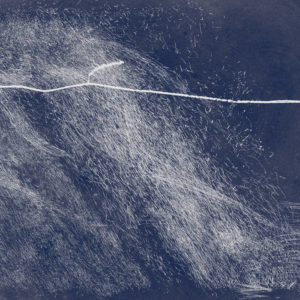
November is the cruellest month. Dead leaves swirling, rainy pavements, listening again to the unbelievable beauty of Mimi Parker’s voice on Low songs like ‘Coattails’, ‘Holy Ghost’ and ‘Just Like Christmas’. It’s going to be a harsh, horrible winter ahead. You just get a pain in your gut reading the news in the paper. Keep the front door closed. Instead of facing the world I can’t stop playing Peter Knight’s Shadow Phase, a totally autumnal bath of gauzy tape delay/effects and mournful trumpet, just out on Australia’s eminent Room 40 label. I’m immediately drawn to Knight as a contemporary composer whose ‘practice exists in the spaces between categories, between genres and between cultures’ – in other words, between the cracks, not falling into obvious pigeon holes; where all the great, listenable and interesting stuff is. The oozing, gaseous opening track ‘The Softened Shore’ unspools slowly before bass and cello figures drift away into a couple of sad but brighter tracks of Knight’s mournful tape loops and crackly laptop effects. It comes as a shock when Polish–Australian free poet Ania Walwicz briefly breaks in at the end of side one speaking of Yukio Mishima’s study of the variety of ways of death contemplated by the samurai on waking each morning — quartered, garrotted, hara-kiri — concluding, ‘I think that’s how all human beings live.’ She laughs heartily at the end, but it’s bittersweet – Walwicz was a former teacher and good friend of Knight’s who accompanied him on many a Melbourne Docklands harbour-side walk during the early days of the pandemic, before she passed on in September 2020.
Put the needle on side two and the sound of creeping fog is back: ‘Eunoia’ is beautifully eerie, eventually stripping away to foamy loops of aqueous trumpet and floating lunar dust. The concluding title track, in its fever dream of percussive rattle and scrape, sounds like it could be from another LP, but it’s an arresting denouement. Like life, the record ends suddenly. Top recommendation if you like Arve Henriksen, Arvo Pärt or William Basinski.
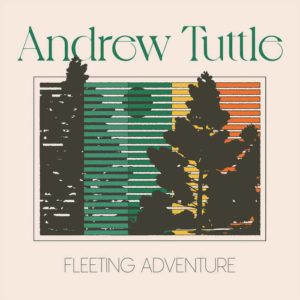
Just up the road, globally speaking (ok, 18 hours’ drive away), banjo don/multi-instrumentalist Andrew Tuttle also savoured the fleeting contacts and small interactions of a long Australian winter of lockdown that led to a discombobulating rethinking of life, relationships, music…everything. His open-hearted Fleeting Adventure (Basin Rock) is a plusher affair than his previous release, featuring the flinty guitar lines of Steve Gunn, the meandering sax of Joe Saxby and the life affirming uplift of both Chuck Johnson’s and Luke Schneider’s pedal steel guitar (among other collaborators). It’s all airy and beautiful: music for a morning with sunlight streaming through the blinds; possibly composed, if the photos on the sleeve are anything to go by — the front room of a high-rise apartment; guitar/banjo/laptop beneath a picture window full of open sky and cloud — with a magisterial view of the Brisbane waterfront. There’s something beautifully airborne, panoramic and ancient about Tuttle’s arrangements — he wastes no time paying his respects to ‘First Peoples around the world’ in the sleevenotes, acknowledging this land is not really his land, but that of the Jagera, Yuggera, Turrbai and Yugambeh folk. I especially love the sleepy eyed ‘Filtering’, Stephen Lewis’s easy dobro and the gentle eighties TV sax of Luke Cuerel (along with Flora Wong and Tony Dupe’s beautiful strings) – and the hopeful gallop of ‘Next Week, Pending’, full of Luck Schneider’s yearning pedal steel.
Tuttle’s previous CD Alexandra (also on Room 40) nailed that ineffable thing: music and place (Alexandra being Tuttle’s endz in the commuter town of Redlands, Queensland, part of a suburban sprawl of Brisbane). ‘Platypus Corridor’, aka Hilliard’s Creek, is both a conservation area, a former indigenous site — no doubt, like much of the northern and eastern territories, plundered by British or European colonists — and also, with its sprightly banjo and lugubrious yet somehow hopeful, cresting trumpet, the beautiful closing track on Alexandra. I got obsessed with the number ‘Cambridge Drive Shopping Centre’, however — plaintive acoustic fingerpicking overlaid on the echoing field recordings of shoppers on a Saturday morning, bright rays of sunshine beaming through the glass atrium, glinting off shiny escalators, picking out all kinds of tropical fauna in planters and interesting pieces of challenging sculpture and public art — a corroded copper screen by Harry Bertoia; an avant-garde water feature, perhaps — placed there in the early 1970s when shopping centres were new, space age and progressive. In Google Earth reality Alexandra Hills Shopping Centre looks a fairly nondescript low-level suburban mall selling doughnuts and camping gas — but, still, what is music’s role but to reflect and amplify the beauty of the everyday world?
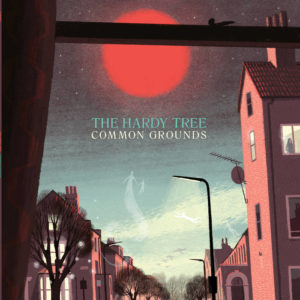
That’s something achieved, and then some — and, again, without a lyric in sight — by Frances Castle on her latest Hardy Tree LP Common Grounds (Clay Pipe Music). The record was released in mid-summer, but there’s something Christmas(ey) about it: the piano on ‘The Spire of St Mary’s’ could be playing on the radiogram of a character in a Patrick Hamilton novel before they head out to their local hostelry on a snowy night; ‘St Saviour’s Through the Railings’ creeps along with an almost bluesy groove, the syncopated red and green lights bathing a mostly deserted church hall dancefloor just as they’ve turned the heaters on. This is a record for misty, wistful Sunday afternoons; beautiful melodies tinged with sadness — alongside quietly ecstatic minor-chord threnodies for, you feel, a past and a city that no longer is. It’s by no means a direct comparison, in terms of the music, but sometimes listening to Common Grounds — on the more upfull numbers like ‘A Garden Square in the Snow’ or ‘Shop Fronts and Parked Cars’ — it feels like Frances, with her tapes and loops, aching mellotron and harpsichord, has bottled tiny fragments of that quintessential English melancholy and euphoria that are both sides of the same coin of moments of 1980s English pop culture — the interesting bits of Depeche Mode; the yearn of Soft Cell; the wistfulness of the Pet Shop Boys circa ‘Always on My Mind’. ‘Railway Tracks’ has the assured, insouciant lightness of touch of a Gilroy Mere on ‘The Age of the Train’ or ‘Just a River’ (from Adlestrop) or a Roy Budd, sleepers and rails criss-crossing and merging with each other at the opening of Get Carter. But, despite it all — despite Billy Casper’s kestrel being slaughtered in the shed; despite the small twisty lanes and dwellings being demolished for the concrete underpass, the Crossrail or high-rise tower blocks — life goes on. Common Grounds is in the lineage of earlier Hardy Tree records Through Passages of Time and The Fields Lie Sleeping Underneath. In another country it would be the RER or the périphérique that signalled change, or time passing — to borrow from translator Mark Polizzotti’s introduction to Patrick Modiano’s Suspended Sentences, it’s as if Frances is channelling her inner Baudelaire: ‘the city scape/Is quick to change, less so the human heart’.
*
Back in the 1990s I remember my sister-in-law and brother-in-law coming round for dinner one night. I was constantly changing the record: Tortoise’s first LP; some Portishead; Ui’s Unlike Remixes, Volume 1. I was obsessed not only with DJ Krush’s Strictly Turntablized but also Oval’s Systemisch — infinite waves of static and glitchy electronica that would float out of the open window of our flat and drift into the quieter moments of John Coltrane, say, or the weave and weft, the bleeps and crackle of In Memoriam Gilles Deleuze, a rhizomatic patchwork of experimental electronica on the Mille Plauteaux label inspired by the recent passing of the eponymous French Philosopher and his search for a ‘non-fascistic life’. ‘Are you actually going to a play a bleedin’ song here?’ I remember my brother-in-law, an avowed Barry White disciple, cutting in. I realise, more than a quarter of a century on, I’m back at this point. Don’t get me wrong, I love plenty of vocalists – Mimi Parker; Stuart Staples; the Morwells; Myriam Gendron; Mouhamoudou Lo of the Wau Wau Collectif; Wes Tirey; Trevor Moss and Hannah Lou; Jimmy Riley; Diane Cluck; Dean Wareham; Nina Nastasia; Nina Simone; Lou Reed; Jake Xerxes Fussell, to name a few — and what they have to say, but I can go for days (weeks) listening to just dub, jazz, ambient; instrumental music all day. Fixtures on the turntable, CD and tape deck of late have included the beautiful loops and drones of Heather Woods Broderick’s Domes; the soft bells, ghostly waltzes and the eerie, misty clatter and scrape of Yara Asmar’s Home Recordings, 2018–2021; the warm analogue glow of Antti Tolvi Spectoral Organ/Feedback Organ; Yui Onodera’s album of sounds ‘from far away that appear in people’s imagined landscape…like vague clouds…cherry blossoms whirling in the wind…snow falling’; Clarice Jensen’s quietly luminous Esthesis (about chromesthesia); Norwegian subaqueous electronics and gentle piano from Anja Lauvdal on her From a Story Now Lost LP; the groovy organ and guitar shapes of South Africa’s The Movers or the soulful jazziness of Ethiopian Modern Instrumental Hits; the hopeful dub of the Revolutionaries and the Aggrovators; Arve Henriksen and Kjetil Husebø’s noirish suite of electronica and jazz Sequential Stream; the crepuscular blues of Forest Management; late Art Pepper live in Japan and America — a thousand pictures painted with, er, no words; in editing terms, show not tell, I guess. When I was younger I found a lot of be-bop too smooth. Now, even ‘Over the Rainbow’ from Art ’n’ Zoot, recorded at Royce Hall, the University of California, in September 1981, sounds of nothing but sadness, the crushing mind-state of addiction, the few highs and many lows depicted in Art and Laurie Pepper’s Straight Life. Or, as John Clellon Holmes put it in his 1958 novel The Horn: be-bop is the sound of ‘the hard winter light on American rooftops’.
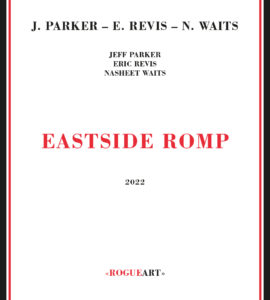
Jeff Parker once told the Quietus, ‘It’s not like this major seventh sharp five chord reflects the complexity and layering of my mother’s angular personality and wry wit,’ when talking about his LP Suite for Max Brown (dedicated to his mom), so, while on the one hand it’s crazy to ascribe any prescription at all, on the other, I’d argue some of the recent records, many on the International Anthem label — from the likes of Jaimie Branch, Angel Bat Dawid, Parker, Luke Stewart and Irreversible Entanglements — reflect that hard light falling on American rooftops more than anything else. Jeff Parker has got two new records out at the moment, both of which I can’t stop playing as the afternoon sky darkens too soon. Eastside Romp (on cool French label Rouge Art) is an improvised group affair, slightly skronky and knotty in places, but full of light and shade, quiet spaces and the beautiful rhythmic energy of Nasheet Waits’ skittering drums and Eric Revis’s wonderfully sinuous double bass. Parker’s painterly unfurling lines and tentative guitar shimmer make his own composition ‘Wait’ broody, elegiac and deeply soulful. A second LP, stitched together from Monday night jams at the Enfield Tennis Academy — nowhere near north London, but a small cocktail bar in Highland Park, Los Angeles — stretches out across four sides of vinyl (Mondays at the Enfield Tennis Academy, Eremite/Aguirre). My favourites are the middle two sides where lovely drum breaks and pulsing bass propel the groove; Parker weaving in and out with his guitar, varying wafts of intensity of Josh Johnson’s sax blowing hot then cool. Midway through side B Jay Bellerose puts his foot down on the pedal and a superbly infectious drum break surfaces — just ace! Total jazz! As invigorating as the first time I heard hip-hop! I can’t better the blurb: ‘a darkly glowing séance of an album, brimming over with the hypnotic, the melodic, & patience & grace in its own beautiful strangeness’.
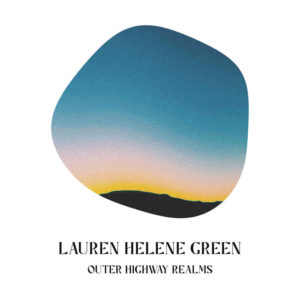
Finally, where to end, but a very listenable sliver of an album: 25 minutes of processed ambient guitar loops and figures and a patchwork of field recordings by multidisciplinary artist/woodworker/musician/New Mexico outback dweller Lauren Helene Green. Outer Highway Realms (Royal Oakie) is a kind of 21st century, synthesized version of Bruce Langhorne’s The Hired Hand soundtrack — fragments, vignettes, contemplative moments of desert solitude captured in all their shimmering beauty: ‘Slow River’ is inspired by staring into the ‘sun reflections, mineral swirls and luminous particles’ of the slow moving Rio Grande; on ‘Walk at Dust’ and ‘Dim Sunset Drive’ you can visualise the smouldering orange half-disk plunging beneath the mesa; ‘Cactus Bloom’ manages to fuse the gorgeous loftiness of Eno’s ‘An Ending (Ascent)’ with the kind of tremolo-sounding lollop and languid desert air of Dean Wareham and Cheval Sombre’s fine tribute LP to the western. There are echoes of the open expanses of William Tyler and the more melancholic moments of Marisa Anderson’s own Sonora desert concept album, Into the Light. Outer Highway Realms was recorded in the ‘frosted winter to early spring cross-fade’ in Ranchos de Taos, New Mexico; the gentle guitar and birdsong of ‘Wind Full of Spring’ soft-pedal hope for the changing seasons, offering the promise of some new shoots and warm sunshine.